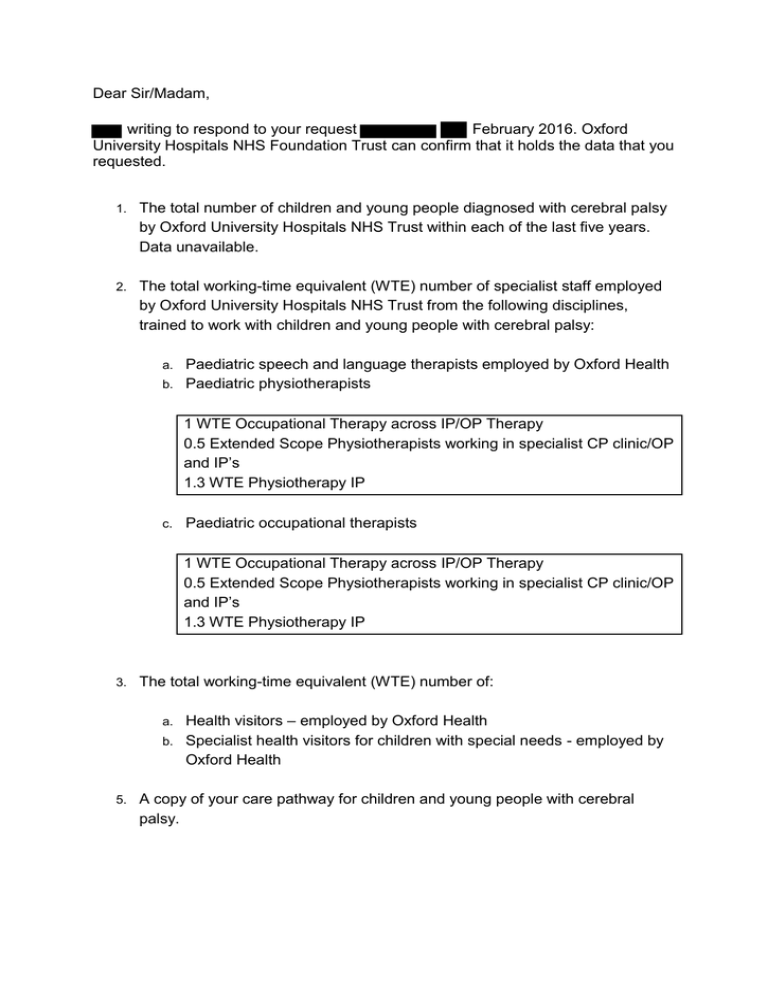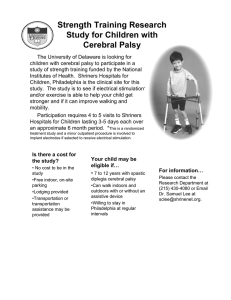Dear Sir/Madam, writing to respond to your request February 2016. Oxford
advertisement

Dear Sir/Madam, writing to respond to your request February 2016. Oxford University Hospitals NHS Foundation Trust can confirm that it holds the data that you requested. 1. The total number of children and young people diagnosed with cerebral palsy by Oxford University Hospitals NHS Trust within each of the last five years. Data unavailable. 2. The total working-time equivalent (WTE) number of specialist staff employed by Oxford University Hospitals NHS Trust from the following disciplines, trained to work with children and young people with cerebral palsy: Paediatric speech and language therapists employed by Oxford Health b. Paediatric physiotherapists a. 1 WTE Occupational Therapy across IP/OP Therapy 0.5 Extended Scope Physiotherapists working in specialist CP clinic/OP and IP’s 1.3 WTE Physiotherapy IP c. Paediatric occupational therapists 1 WTE Occupational Therapy across IP/OP Therapy 0.5 Extended Scope Physiotherapists working in specialist CP clinic/OP and IP’s 1.3 WTE Physiotherapy IP 3. The total working-time equivalent (WTE) number of: Health visitors – employed by Oxford Health b. Specialist health visitors for children with special needs - employed by Oxford Health a. 5. A copy of your care pathway for children and young people with cerebral palsy. Children with suspected cerebral palsy/motor difficulties are referred to Community Paediatrics via many routes. (i.e. health visitor, children’s community physiotherapist, GP, neurologist or neonatologist) . Initially these children are seen in the outpatient clinic and then depending upon the clinical findings are investigated either at the JR or the Horton. Support services are involved after initial assessments (if not already involved) but this depends upon the severity and co-morbidities. Some patients, assessed on an individual basis, will have an appointment for multidisciplinary assessment at the Children’s Hospital 6. A copy of your service framework for children and young people with cerebral palsy. There is no SF for children and young people with cerebral palsy. Where there are national guidelines such as NICE these are followed 7. Whether there is a specific timescale set out in your care pathway for referral for diagnosis of cerebral palsy, from the point of the formal identification of symptoms. There is no specific time frame for diagnosis. It would not be possible to achieve this as it depends upon the age of the child and underlying risk factors. As one of the diagnostic investigation is the brain MRI it is not meaningful until myelination is complete and sometimes repeat imaging is necessary if the initial MRI is non specific. 9. An overview of training and advice provided by Oxford University Hospitals NHS Trust for health professionals on identifying and referring children with cerebral palsy. There is no specific training programme for health professionals for identifying and referring cerebral palsy. The trainees receive teaching and experience as a part of their working in the department. There is teaching for health visitors and GPs which included developmental assessment and the referral process if a child is not meeting the expected milestones and cerebral palsy is mentioned in these sessions. All nursing students receive training on developmental assessment and reasons for deviation from usual milestones. Please note that on 1 November 2011 the Oxford Radcliffe Hospitals NHS Trust (ORH) merged with the Nuffield Orthopaedic Hospital NHS Trust (NOC) to form the Oxford University Hospitals NHS Trust (OUH). Our response reflects these changes. Therefore, we consider that Oxford University Hospitals Trust has released to you all of the information that it holds in relation to your request. Internal review If you are dissatisfied with the service or response to your request you can ask for an internal review by writing to: , Director of Assurance, John Radcliffe Hospital, Headley Way, Headington, Oxford OX3 9DU. If you remain dissatisfied with the handling of your request or complaint, you have a right to appeal to the Information Commissioner at: The Information Commissioner's Office, Wycliffe House, Water Lane, Wilmslow, Cheshire, SK9 5AF. Telephone: 0303 123 1113 Website: www.ico.gov.uk Provision of this information does not constitute permission for its commercial re-use in terms of the Re-Use of Public Sector Information Regulations 2005. You are free to use the information for your own use, including for non-commercial research purposes. The information may also be used for the purposes of news reporting. However, any other type of re-use will require permission from the Oxford University Hospitals NHS Trust. Yours sincerely,


